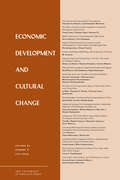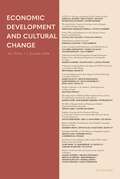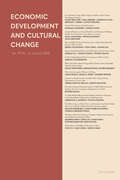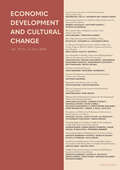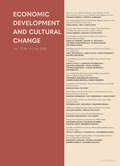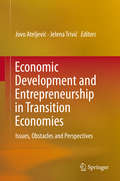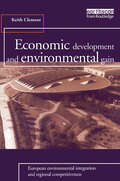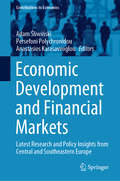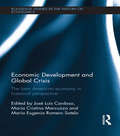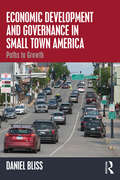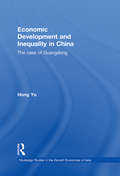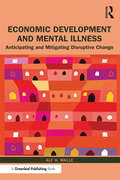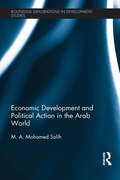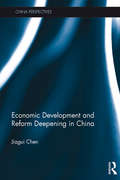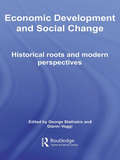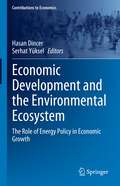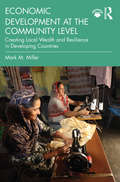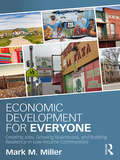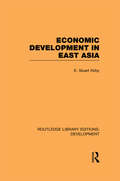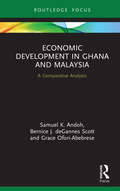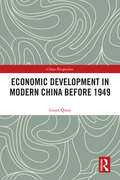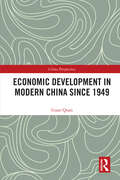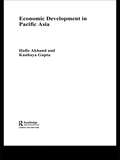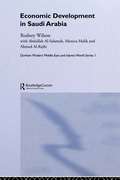- Table View
- List View
Economic Development and Cultural Change, volume 72 number 4 (July 2024)
by Economic Development and Cultural ChangeThis is volume 72 issue 4 of Economic Development and Cultural Change. Economic Development and Cultural Change (EDCC) publishes studies that use modern theoretical and empirical approaches to examine both the determinants and the effects of various dimensions of economic development and cultural change. EDCC’s focus is on empirical papers with analytic underpinnings, concentrating on microlevel evidence, that use appropriate data to test theoretical models and explore policy impacts related to economic development.
Economic Development and Cultural Change, volume 73 number 1 (October 2024)
by Economic Development and Cultural ChangeThis is volume 73 issue 1 of Economic Development and Cultural Change. Economic Development and Cultural Change (EDCC) publishes studies that use modern theoretical and empirical approaches to examine both the determinants and the effects of various dimensions of economic development and cultural change. EDCC’s focus is on empirical papers with analytic underpinnings, concentrating on microlevel evidence, that use appropriate data to test theoretical models and explore policy impacts related to economic development.
Economic Development and Cultural Change, volume 73 number 2 (January 2025)
by Economic Development and Cultural ChangeThis is volume 73 issue 2 of Economic Development and Cultural Change. Economic Development and Cultural Change (EDCC) publishes studies that use modern theoretical and empirical approaches to examine both the determinants and the effects of various dimensions of economic development and cultural change. EDCC’s focus is on empirical papers with analytic underpinnings, concentrating on microlevel evidence, that use appropriate data to test theoretical models and explore policy impacts related to economic development.
Economic Development and Cultural Change, volume 73 number 3 (April 2025)
by Economic Development and Cultural ChangeThis is volume 73 issue 3 of Economic Development and Cultural Change. Economic Development and Cultural Change (EDCC) publishes studies that use modern theoretical and empirical approaches to examine both the determinants and the effects of various dimensions of economic development and cultural change. EDCC’s focus is on empirical papers with analytic underpinnings, concentrating on microlevel evidence, that use appropriate data to test theoretical models and explore policy impacts related to economic development.
Economic Development and Cultural Change, volume 73 number 4 (July 2025)
by Economic Development and Cultural ChangeThis is volume 73 issue 4 of Economic Development and Cultural Change. Economic Development and Cultural Change (EDCC) publishes studies that use modern theoretical and empirical approaches to examine both the determinants and the effects of various dimensions of economic development and cultural change. EDCC’s focus is on empirical papers with analytic underpinnings, concentrating on microlevel evidence, that use appropriate data to test theoretical models and explore policy impacts related to economic development.
Economic Development and Entrepreneurship in Transition Economies
by Jovo Ateljević Jelena TrivićThis book contributes to a better understanding of entrepreneurship in transition economies. Current literaturereflects the more traditional schools of thought on entrepreneurship, which areinfluenced by the Western perspective, and fail to fully address the scenarioin transition economies. There is a broad consensus among academics, policymakers, and practitioners that a fundamental cause of difficulties experiencedby most economies in transition has been the fact that reform has not been accompaniedby the creation of new, private businesses, and particularly SMEs. This isespecially evident in states created in Europe after the dissolution of theSoviet Union where many barriers, which were inherited from the old system,remain in place, thus inhibiting entrepreneurial progress in these countriesdespite a favorable political and economic environment. The contributions featuredin this book focus on how much progress has been achieved so far with regard tothese aspects, as well as identify which current barriers and issues still needto be resolved. Themes include innovation performance, financing, venturecapital, educational factors, and entrepreneurial learning.
Economic Development and Environmental Gain: European Environmental Integration and Regional Competitiveness
by Keith ClementThis volume contains detailed information and assessment of incentives and policy instruments available within Europe to encourage good practice, and of how to achieve environmental gain in regional economic programmes. It describes an appropriate methodology for securing improved environmental benefit and explores the potential for achieving regional environmental competitiveness. There are insights based on wide international comparative experience of programme evaluation.
Economic Development and Financial Markets: Latest Research and Policy Insights from Central and Southeastern Europe (Contributions to Economics)
by Anastasios Karasavvoglou Persefoni Polychronidou Adam ŚliwińskiThis book offers fresh insights into the economic development and financial markets of Southeastern and Central European countries. The first part analyses macroeconomic trends and monetary policy issues, while the second part explores the development of financial and insurance markets. With contributions covering topics such as regional and income inequalities, economic embeddedness, industrial competitiveness, entrepreneurship, financial integration, insurance markets, and other socio-economic aspects, it appeals to scholars in the field of economics and finance interested in the further economic development of the Balkans and Eastern European countries as well as to professionals in the financial and insurance sectors.
Economic Development and Global Crisis: The Latin American Economy in Historical Perspective (Routledge Studies in the History of Economics #161)
by José Luís Cardoso Maria Cristina Marcuzzo María Eugenia Romero SoteloThis edited collection uses a history of economic thought perspective to explore the evolving role of Latin America within the context of globalization. In particular, it examines the region’s resilience in the face of the global financial crisis. Economic Development and Global Crisis explains that Latin America is a region with distinct characteristics and peculiarities which have been shaped from the colonial era up to the present day. The contributions suggest that several features which were perceived as economic backwardness have turned out to be advantageous, and this may explain why Latin America is withstanding the crisis much better than Europe, Japan and the USA. This book will be of interest to scholars working in the areas of economic development, economic history, the history of economic thought and Latin American studies.
Economic Development and Governance in Small Town America: Paths to Growth
by Daniel BlissWho governs? And why? How do they govern? These remain vital questions in the politics of our small cities and towns. In this new book, author Daniel Bliss takes issue with those who believe that small towns and cities are fatally vulnerable to the pressures of a global economy. Based on in-depth analyses of small town America, this book demonstrates how political agency can address and solve real problems affecting US towns, including capital flight, industrial closures, and job losses. Bliss illustrates how small localities exercise choices – such as nurturing local businesses and developing infrastructure rather than engaging in a "race to the bottom," heavily mortgaging tax revenues to attract large box retailers and small box call centers while passively watching more productive firms and better-paying jobs slip away. Taking careful account of comparative literature as well as variations in city governments, their planning agencies, and their relations with state authorities, this book explores the ways in which local politicians and public planning bodies can mobilize local constituencies to weather global challenges and common structural problems such as unfavorable demographics, skill shortages and out-migration. Economic Development and Governance in Small Town America holds out the promise of meaningful democratic change even in unfavorable political and economic circumstances.
Economic Development and Inequality in China: The Case of Guangdong (Routledge Studies in the Growth Economies of Asia)
by Hong YuThe conventional belief that all regions have equally benefited from China’s remarkable development over the last three decades is subjected to criticism in this book as Hong Yu systematically analyses the issue of regional inequality during the post-1978 period using the case of Guangdong. Guangdong is one of the key industrial centres and economic powerhouses in China and as a pioneer province, instigating economic reform as China opened up to the world, it offers an ideal focus upon which to question and enrich the Western theories of economic geography and regional disparity. Based on field research, analysis of geographic characteristics and regression models, this book illustrates how Guangdong’s impressive development record has been marred by its rising regional disparity, investigates the main causes of this disparity, and draws conclusions regarding the lessons China can learn from it. Economic Development and Inequality in China will be of interest to students and scholars of Chinese economics, Chinese regional studies, economic geography and China Studies. Hong Yu is a Visiting Research Fellow at the National University of Singapore. His research interests lie in the field of regional economy. He is the author of a chapter on China’s two delta regions in the book "China and The Global Economic Crisis".
Economic Development and Mental Illness: Anticipating and Mitigating Disruptive Change
by Alf H. WalleSocial, economic, and technological changes disrupt many Indigenous, ethnic, and rural communities even when offering progress. Under these conditions, social and psychological dysfunctions are likely to emerge. This book provides insights regarding how to anticipate, prevent, and, when necessary, provide mitigation strategies to communities and individuals who suffer as a result. This book, the first of its kind, provides an overview of strategic and policy issues involving the relationship between change and dysfunction, enabling the reader to more effectively deal with potentially hurtful influences in proactive, equitable, and culturally sensitive ways. After providing a theoretical overview, methods for anticipating the hurtful impacts of change are discussed, along with techniques for mitigating its negative effects upon communities and individuals. Learning objectives and discussion questions are included with each chapter, and the book can serve as a text for courses on indigenous economic development, Native studies, culturally appropriate business, and culturally competent therapy. It can also be used as a professional handbook for practitioners working with communities affected by these issues.
Economic Development and Political Action in the Arab World (Routledge Explorations in Development Studies)
by M.A. Mohamed SalihAnalysis of North African revolt against authoritarianism, known as the ‘Arab Spring’, embraced reductionist explanations such as the social media, youth unemployment and citizens’ agitations to regain dignity in societies humiliated by oppressive regimes. This book illustrates that reductionist approaches can only elucidate some symptoms of a social problem while leaving unexplained the economic and political structures which contributed to it. One outcome of quiescence, resource-based ethnic and sectarian conflicts and faulty development paradigm is deepened inequality and a wedge between winners and losers or affluence, wealth and power vis-à-vis poverty and hunger among humiliated jobless and hope-less masses. The book blends theories of development and transition to explain the complex factors which contributed to North Africans’ revolt against authoritarianism and its long-term consequences for political development in the Arab World. This timely book is of great interest to researchers and students in Development Studies, Economics and Middle Eastern Studies as well as policy makers and democracy, human rights and social justice activists in the Arab world.
Economic Development and Reform Deepening in China (China Perspectives)
by Jiagui ChenThis book, together with Macro-control and Economic Development in China is a collection of papers written in recent years about maintaining economic growth, managing inflation, the relationship between growth and structural adjustment, control of price growth, maintaining stable economic development, and other relevant aspects of macro-control, economic development, and deepening reform. Chinese government adopts many of the recommendations put forward by the book.
Economic Development and Social Change (Routledge Studies in the History of Economics #Vol. 78)
by Gianni Vaggi George StathakisSome of the greatest thinkers in the history of economic thought have been instrumental in advancing the study of development economics. In this volume, leading scholars are brought together to illuminate this tradition, with particular emphasis on the question of growth and development. Divided into two parts, this collection offers a blend of papers of history of economic thought and development economics, and suggests that classical political economy - that strand of thought which goes from Physiocracy to Smith and to Ricardo and Marx - has a precise vision and indeed a precise model of long term development. This book: examines the influence that has been exerted by both pre-classical and classical thought on modern day development economics provides a synthetic analysis of the classical vision of growth and development from the mercantilist era to physiocracy examines Adam Smith’s contribution to growth theory explores Marxian thinking and ideas, and the political developments that gave rise to state functions in post-war theory. Including contributions by well known authors such as Eltis, Murphy and Kurz, this significant volume by one of the premier historians of economic thought will be a valuable resource for postgraduates and professionals in the fields of economic history and political economy.
Economic Development and the Environmental Ecosystem: The Role of Energy Policy in Economic Growth (Contributions to Economics)
by Hasan Dincer Serhat YükselThis volume illustrates the relationship between environmental factors and economic development of countries from various angles. Global warming has become a problem that threatens the whole world, especially in recent years. It is known that the main reason for this is carbon emissions. On the other hand, carbon emissions generally consist of fossil fuel-based energy consumption. This situation creates very serious environmental problems. Because of this problem, the concept of carbon zero has become very popular, especially in recent years. Many countries take some actions to minimize carbon emissions. Especially in the coming years, carbon emissions will become a competitive factor for countries and businesses. In this respect, countries with low carbon emissions will be preferred more in foreign trade. In addition, businesses that do not generate carbon emissions in the production process will also gain a significant competitive advantage in international trade. The contributions take a multidimensional outlook to energy investments and offer solutions for decision-making for energy projects in risky business ecosystems.
Economic Development at the Community Level: Creating Local Wealth and Resilience in Developing Countries
by Mark M. MillerHow do we create more economic opportunities in the low-income communities of the developing world? How can these communities build greater resilience against economic uncertainties, natural disasters, wars, and the growing threats of climate change? This book reviews the research literature of economic development in low-income communities of the developing world—from rural villages to neighborhoods in the largest cities on earth. This book is unique in gathering, organizing, and synthesizing research on economic development at the community level, across the developing world, drawing from multiple disciplines, publications, methodologies, regions, and countries. Part I provides an overview and context of the many challenges facing the developing world today, as well as the often-heated debates over what "development" is and how to make it happen. Part II reviews the extensive research literature in major fields of community economic development including education and human capital, overcoming the "curse of natural resources," entrepreneurship and micro-finance, tourism, and sustainability. The audience includes undergraduate students interested in development and sustainability, graduate students and other young researchers in a wide range of disciplines who are finding their own focuses, and established researchers who wish to expand their agendas. An expanded bibliography accompanies the book as a downloadable supplement.
Economic Development for Everyone: Creating Jobs, Growing Businesses, and Building Resilience in Low-Income Communities
by Mark M. MillerHow do we create employment, grow businesses, and build greater economic resilience in our low-income communities? How do we create economic development for everyone, everywhere – including rural towns, inner-city neighborhoods, aging suburbs, and regions such as Appalachia, American Indian reservations, the Mexican border, and the Mississippi Delta – and not just in elite communities? Economic Development for Everyone collects, organizes, and reviews much of the current research available on creating economic development in low-income communities. Part I offers an overview of the harsh realities facing low-income communities in the US today; their many economic and social challenges; debates on whether to try reviving local economies vs. relocating residents; and current trends in economic development that emphasize high-tech industry and high levels of human capital. Part II organizes the sprawling literature of applied economic development research into a practical framework of five dynamic dimensions: empower your residents: begin with basic education; enhance your community: build on existing assets; encourage your entrepreneurs; diversify your economy; and sustain your development. This book, assembled and presented in a unified framework, will be invaluable for students and new researchers of economic development in low-income communities, and will offer new perspectives for established researchers, professional economic developers and planners, and public officials. Development practitioners and community leaders will also find new ideas and opportunities, along with a broad view on how the many complex parts of economic development interconnect.
Economic Development in Early Modern France
by Jeff HornPrivilege has long been understood as the constitutional basis of Ancien Regime France, legalising the provision of a variety of rights, powers and exemptions to some, whilst denying them to others. In this fascinating new study however, Jeff Horn reveals that Bourbon officials utilized privilege as an instrument of economic development, freeing some sectors of the economy from pre-existing privileges and regulations, while protecting others. He explores both government policies and the innovations of entrepreneurs, workers, inventors and customers to uncover the lived experience of economic development from the Fronde to the Restoration. He shows how, influenced by Enlightenment thought, the regime increasingly resorted to concepts of liberty to defend privilege as a policy tool. The book offers important new insights into debates about the impact of privilege on early industrialisation, comparative economic development and the outbreak of the French Revolution. "
Economic Development in East Asia (Routledge Library Editions: Development)
by E. Stuart KirbyFirst published in 1967, this influential study reviews the economic development of 15 countries from East Asia in the period between 1945 and 1965. It deals with a wide variety of factors influencing the development of the region, including the influence of foreign governments (both international aid and foreign trade); population development; industrialisation; transport and communication infrastructure; and the impact of economic development upon the population of East Asia.
Economic Development in Ghana and Malaysia: A Comparative Analysis (Routledge Explorations in Development Studies)
by Samuel K. Andoh Bernice J. deGannes Scott Grace Ofori-AbebreseEconomic Development in Ghana and Malaysia investigates why two countries that appeared to be at more or less the same stage of economic development at one point in time have diverged so substantially. At the time of their independence from the UK in 1957, both Ghana and Malaysia were at roughly the same stage of economic development; in fact, Ghana’s real per capita income was slightly ahead of Malaysia’s. Since then, Ghana’s development has been sluggish, while Malaysia’s economy has taken off into sustained growth and today, the real per capita income of Malaysia is about five times that of Ghana. This volume examines the pre-colonial and colonial economies of both countries, and the economic policies pursued after independence. In doing so, it aims to identify policies which might have contributed to Malaysia’s development and those which might have slowed Ghana’s. The authors ask whether lessons can be learned from the successes of countries such as Malaysia. This detailed comparative analysis will be useful to students and researchers of development economics as well as public policy makers in developing countries. It is written in language which makes it accessible to the general reader.
Economic Development in Modern China Before 1949 (China Perspectives)
by Guan QuanAs the first volume of a two-volume set on Chinese economic history, this book investigates Chinese economic development between 1912 and 1949 and unravels the overall level during that time. From the perspective of development economics, the two-volume set studies the economic history and development of China since 1912, with a focus on the quantitative analysis of economic activities. Comprised of two core parts, this first volume, centering on the period of the Republic of China, first describes the historical process and characteristics of the economy at different stages and then looks into the momentum and inner logic that underpin the economic development. The former part covers issues of agriculture, industry, population, and labour force, urbanization, price changes, people’s consumption and living standard, regional difference, etc. The latter part includes discussions on natural and human resources, capital formation and technological progress, the role of government and finance, international trade, and foreign capital. This title will be an interesting read for scholars and students working on Chinese economic history, the Chinese economy, and modern Chinese society.
Economic Development in Modern China Since 1949 (China Perspectives)
by Guan QuanAs the second volume of a two-volume set on the Chinese economic history, this book investigates Chinese economic development since 1949, uncovering the momentum, unique models, and general laws of economy in China.From the perspective of development economics, the two-volume set studies the economic history and development of China since 1912, with a focus on the quantitative analysis of economic activities. This volume describes the historical process and characteristics of the economy since 1949, then looks into the momentum and inner logic that underpin the economic development. The former part covers issues of agriculture, industry, population and labor force, urbanization and mobility, income distribution and poverty, and price changes. The latter part includes analyses on the capital formation, human resources, technological progress, institutions, macro policies, international trade, and direct investment.This title will interest scholars and students working on Chinese economic history, the Chinese economy, and modern Chinese society.
Economic Development in Pacific Asia
by Hafiz Akhand Kanhaya GuptaDuring the period 1965 to 1990 East Asia was the world’s fastest growing region. Economic Development in Pacific Asia provides illuminating, non-technical perspectives on key facets of the region’s economies. The text focuses on the eight countries which accounted for the majority of the economic growth: Japan, Hong Kong, Taiwan, Republic of Korea, Indonesia, Malaysia, Singapore and Thailand. Empirical evidence is used to provide a revealing, multi-dimensional statistical profile of the countries as well as the region as a whole. Rather than present a statistical history of each country, the text highlights the relative performance in terms of the variables which are studied within each chapter. Akhand and Gupta examine a range of popular topics including: the relative role of factors accumulation versus technology change factor price distribution and employment growth, poverty and income distribution the Asian Crisis and corruption. In addition, the book examines topics rarely covered in the current economics literature such as urbanization, the gender gap and the digital divide. It provides an accessible and wide ranging assessment of the existing evidence and current arguments on East Asian economic development, and is a valuable addition to economists, policy makers and those interested in Asian economic affairs.
Economic Development in Saudi Arabia (Durham Modern Middle East and Islamic World Series)
by Rodney Wilson Monica Malik Ahmed Al Rajhi Abdullah Al SalamahThe changing political situation in the Middle East poses challenges for the economies of the region, and some see none more vulnerable to collapse than Saudi Arabia's. Yet as this study demonstrates, the fundamentals of the Kingdom's economy are relatively robust, as over three quarters of GDP is accounted for by the non-oil sector, and impressive modern industries have been established, notably in petrochemicals. The financial system functions well, and despite substantial government debts, there is low inflation and currency stability. The private sector increasingly drives the economy, although job creation has been insufficient to prevent rising youth unemployment. The development challenges Saudi Arabia faces are similar to those of other middle-income countries, and three decades of diversification have made the economy less unique than it was in the oil boom years of the 1970s.
